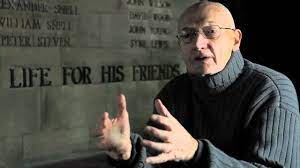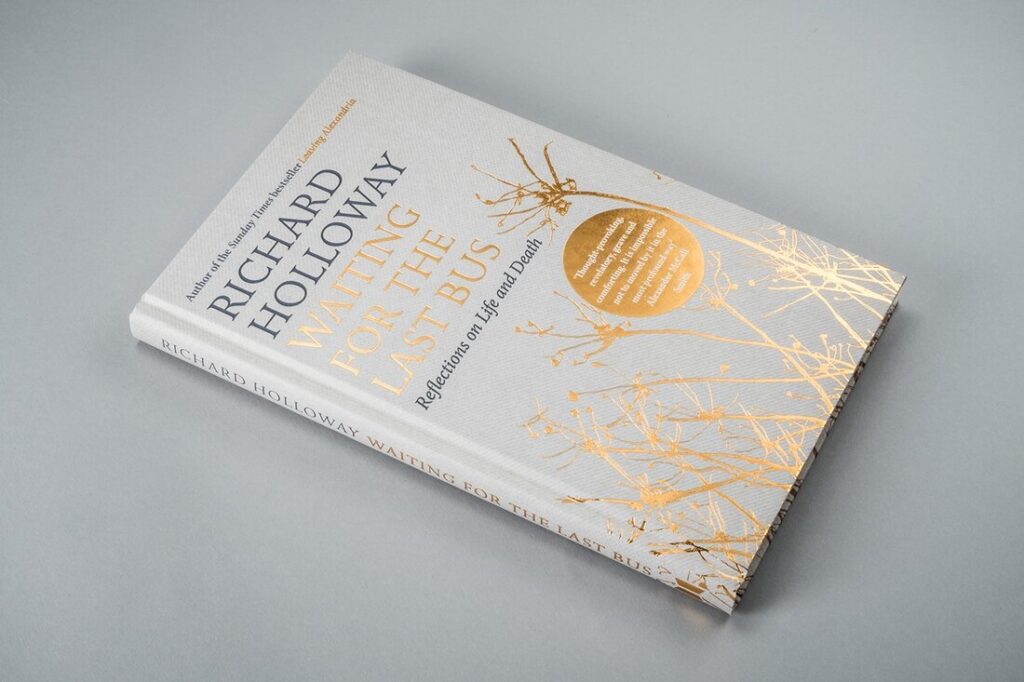Book Review of Richard Holloway's Waiting For The Last Bus

With searing honesty, Richard Holloway grapples with his religious beliefs and doubts. He considers what it means to have lived a good life and how people manage their worries of the afterlife. He explores the big questions and faces his own uncertainties. The necessity we often feel to view things in binary terms, and the limitations of doing so, is a theme he frequently returns to in the text.
Using anecdotes and beautiful examples, drawn from fiction and philosophy, Holloway gets to the very crux of what it means to be alive. Of course we can’t know for sure about the opposite, which Holloway acknowledges, but he explains how dominant death is in his thoughts and contemplates the afterlife. Holloway even talks about those who believe they have come back from the brink of death, doing so in a thoughtful and sympathetic manner. Holloway looks at those of us who are focused on living a good life and those of us who are more concerned with heading to the afterlife, exploring the part religion plays in that.
This is a text to return to. Within Waiting For The Last Bus is sound advice, though never dogmatically presented, on how to handle large life problems and how to keep perspective. Rather than telling the reader they should respond to situations, with certain patterns of behaviour or actions, Holloway reveals how people’s lives will be either enhanced or diminished according to how they think about issues and situations they are in. He makes interesting observations about the past, present and future. We can’t change the past, but we can change the future. The absolute necessity of being able to forgive is a key theme to which he frequently returns to in his writing.
In attempting to review Holloway’s book it is easy to fall into the trap of presenting his text as a self help manual. That’s not what it is at all but it is a book that is full of wisdom. I guess if I was trying to give it a genre I’d call it a philosophical tract, but one full of humility, warmth and understanding. It sets the big questions in everyday frameworks we can understand and relate to, but it never reduces the significance of that which it explores. Everyone will remember something different in Holloway’s writing and take their own meaning from it.
Book Discussion Questions on Richard Holloway's Waiting For The Last Bus
“Most of us were brought up to believe we made ourselves and constructed our own destiny.” This is the opening of a chapter where Holloway goes on to explore whether we do in fact have free choice. Discuss your views of free choice, referring to chapter three as you share your ideas.
Holloway quotes Derek Walcott more than once in this book. What do you think Walcott’s line ‘… give back your heart to itself’ means?
Holloway quotes Hamlet’s soliloquy when Hamlet contemplates murdering his stepfather Claudius, but chooses not to kill him while he is praying. He claims this is “hire and salary, not revenge …” Do you think taking revenge is ever helpful? Have you ever had revenge taken on you? Do you have any revenge stories to share?
Holloway says “Grief is shattering, but it can be survived if we let oursevles experience it. It has to be done, not bypassed, muffled or diverted.” Discuss grief.
In Waiting For The Last Bus, Holloway shares anecdotes of people having planned their own funerals. One person he knew went as far as recording themselves singing the pieces they wanted played. What music would you have played at your own funeral? Discuss what you think makes a good funeral?
“Our tragedy is that though we do not know what we are doing when we act, our actions are irreversible..” Discuss this Richard Holloway quotation. Is there any point having regrets in life? What can we do to reduce the sorrow or regrets we do have?

Book Discussion on Waiting For The Last Bus (If you haven't read the book!)
Holloway frequently uses the bible as a prompt from which it is possible to discuss philosphical ideas. Where do you get most of your inspiration for ‘deep and meaningful’ conversation from?
With or without having read the book, how do you interpret the metaphor Waiting for the Last Bus?
What would you consider to have been a good life?
Death is the one certainty in life. Does thinking about that make you want to change anything in your own life? Will you implement the changes?
Holloway thinks that the ability to forgive prevents individuals being stuck in a lifetime of regret and resentment. How easy do you find it to forgive people?
Holloway draws a lot on Larkin’s poetry. Do you have a favourite poet that you read in order to help you understand life?
Holloway talks of someone ringing him to check a fact for his obituary. What would you like people to say about you in your obituary?
What is the purpose of a funeral? Discuss.
Holloway has spent much of his life struggling with his faith, lack thereof and what it means to be a believer. Discuss your own religious views with one another? Which religion holds most appeal for you and why?
Personal Response to Waiting For The Last Bus
It is necessary to concentrate to read this book. It isn’t something to escape into, it needs thinking about. Its relevance and importance are such that I want all my friends, foes, and anyone in between to read it. If you’re recently lost someone then it is perhaps particularly poignant to read, but it is as much about life as it is about death.
Based on a series of radio interviews it is possible to pick up and read any chapter. It isn’t essential to read it in a linear fashion from beginning to end, but there is something powerful to think about on each and every page. I don’t think I’m being dramatic to say that my own future may be just a little bit changed from having read it.